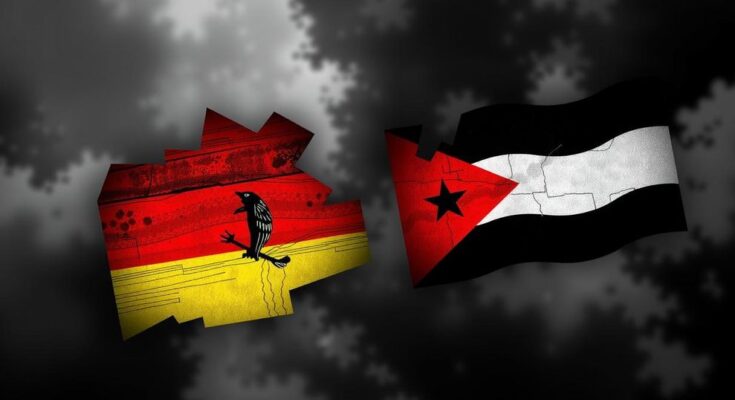The article examines Israel’s military operations in Gaza, resulting in significant civilian casualties and widespread protests across Europe. German Foreign Minister Annalena Baerbock’s controversial remarks on civilian casualties have drawn condemnation from various quarters, highlighting Germany’s contentious support for Israel amidst accusations of genocide. Tensions rise as demonstrators call for an end to arms sales to Israel while drawing historical parallels to Germany’s past colonial atrocities. This situation underscores the complexity of Germany’s current geopolitical stance against the backdrop of historical accountability.
The recent actions of Israel in Gaza have elicited widespread condemnation and protests across Europe, as demonstrators assert that the ongoing military operations amount to genocide. The Israeli military has claimed responsibility for the deaths of over 42,600 Palestinians since their offensive commenced on October 7, 2023, including a staggering number of children. In parallel, Israel’s longstanding conflict with Hezbollah has claimed additional casualties. Amidst these events, German authorities have taken steps to suppress demonstrators in Berlin, reflecting a contentious national dialogue on Germany’s historical and political stance towards Israel. Germany’s foreign minister, Annalena Baerbock, has ignited outrage by suggesting that civilian deaths in Gaza could be justified under the guise of self-defense against Hamas. Critics, including Hamas and the Palestinian Islamic Jihad, have vehemently rejected these remarks, arguing that they absolve the government of Israel from accountability for its actions in Gaza. Human rights advocates assert that Germany’s support for Israel, reminiscent of previous colonial atrocities perpetrated by the nation, signifies an ethical failure by the current administration. As protests erupted across Europe, demonstrators called for an end to arms sales to Israel and criticized their governments for complicity in the ongoing violence. While tensions rise, Israel’s military leadership continues to frame their actions in Gaza and Lebanon as necessary strikes against terrorism, further aggravating international calls for accountability. The persecution faced by demonstrators in Germany raises questions about the state’s role in inhibiting public discourse on their support for Israel’s policies. There is a growing sentiment among many that Germany’s current alignment with Israel, particularly in the context of the Gaza conflict, echoes its historical complicity in genocidal acts, from colonial times in Namibia to the unchecked violence in contemporary Gaza and Lebanon. This historical awareness informs current debates on humanitarian principles and geopolitical alliances in Europe.
The article discusses the extensive violence perpetrated by Israel in Gaza and Lebanon, highlighting significant civilian casualties and the international backlash against Israel’s military actions. The government of Germany, while maintaining support for Israel, faces internal dissent as citizens protest against the violence and demand a cessation of arms supplies to Israel. The article also draws parallels between Germany’s historical actions during colonial times in Namibia and its current support for Israel, framing these as acts of complicity in genocide. This context sheds light on the moral and ethical implications of Germany’s policies towards conflict in the Middle East.
In conclusion, the ongoing military actions in Gaza and Lebanon by Israel, accompanied by the strong denunciation from various international entities and communities, have triggered serious ethical and moral considerations regarding Germany’s role as a supporter of Israel. The complexities of historical parallels are drawn between past genocides and current events, revealing a disturbing continuity in European involvement in acts of violence and complicity. The oppression of peaceful demonstrators in Germany reflects a broader societal struggle to reconcile historical injustices with current diplomatic stances, prompting calls for accountability and change.
Original Source: www.tehrantimes.com




